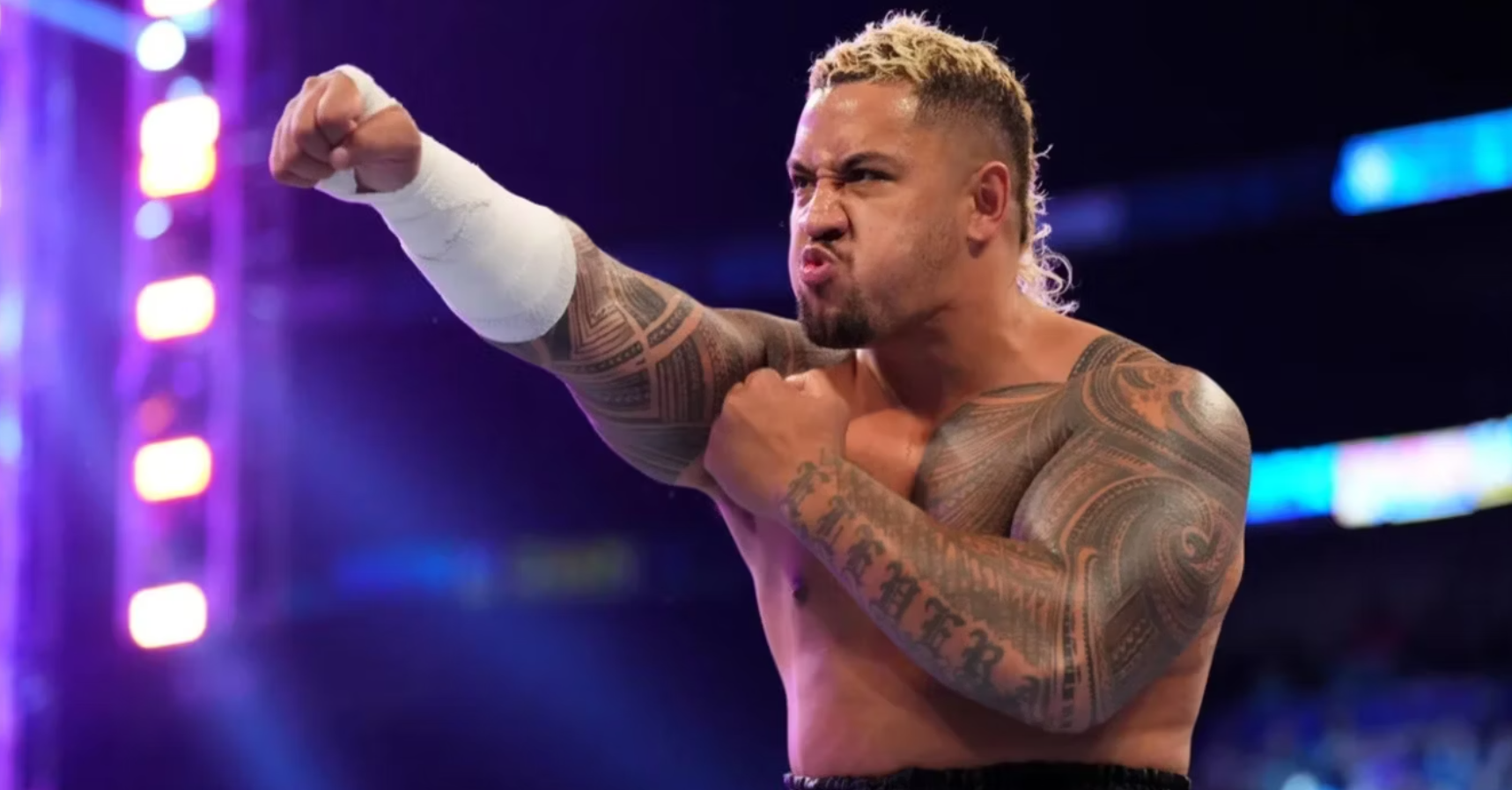Solo Sikoa: American Professional Wrestler
Solo Sikoa is an American professional wrestler who has made a notable impact on the wrestling scene through his unique style and fierce determination. Born in the United States, Sikoa comes from a strong lineage of Samoan wrestlers, a heritage that has certainly influenced his wrestling techniques and his approach to the sport. He has carved a niche for himself in the wrestling world and continues to excite fans with his powerful performances and raw strength.
Sikoa’s journey in the professional wrestling industry began in the independent circuit, where he honed his skills and developed his distinct style. His performances caught the attention of WWE (World Wrestling Entertainment), one of the biggest professional wrestling organizations globally. In 2021, Sikoa made his WWE debut, where his remarkable talent and intense matches have quickly made him a fan favorite.
One of Sikoa’s standout characteristics is his sheer physicality. Standing over six feet tall and weighing more than 250 pounds, Sikoa has an intimidating presence in the ring, which he uses to his advantage. His wrestling style is a blend of power, agility, and technical prowess. He executes his moves with precision, demonstrating his thorough understanding of the sport and the strategy required to win.
Another aspect of Sikoa’s wrestling that stands out is his cultural heritage. As a member of the legendary Anoa’i family, he carries the legacy of Samoan wrestling with pride. This lineage includes wrestling legends like Rikishi and The Rock, which adds a depth of history and respect to his performances. Sikoa has often paid homage to his Samoan roots in his in-ring persona, showcasing traditional Samoan tattoos and incorporating elements of Samoan culture into his wrestling style.
Furthermore, Sikoa’s impact on the wrestling industry extends beyond his in-ring performances. He has become a role model for aspiring wrestlers, inspiring them with his dedication, resilience, and love for the sport. His success story has shown that with hard work, passion, and commitment, it is possible to ascend the ranks and make a name for oneself in the highly competitive world of professional wrestling.
In conclusion, Solo Sikoa’s contributions to American professional wrestling are significant and noteworthy. His unique style, rich cultural heritage, and unwavering dedication to the sport have made him a standout figure in the industry. As his journey continues, there’s no doubt that Sikoa will continue to captivate fans and leave a lasting legacy in the world of professional wrestling.

Early Life and Background
The early life and background of a person significantly shape their personality, character, and choices in life. It is a period of growth and development that ensues from birth and continues through adolescence, forming the foundation of an individual’s life. This phase is influenced by a plethora of factors, including but not limited to, family structure, socio-economic status, cultural norms, and education.
The family is the primal source of socialization for a child, and the economic status of a family can greatly impact the opportunities and experiences available to the child. The cultural norms and values instilled during this time also play a crucial role in shaping the child’s worldview and behavior. Moreover, the quality and level of education the child receives can significantly influence their cognitive development and future prospects. It is during these formative years that children learn to navigate social interactions, develop emotional intelligence, and acquire skills and knowledge that will be instrumental in their adult life.
The background of an individual, which encapsulates their early life experiences, family history, and cultural heritage, can also have profound effects on their identity, perspectives, and life trajectory. It is a complex tapestry of experiences and influences that contribute to the uniqueness of each individual. Overall, the early life and background of a person serve as pivotal determinants in sculpting their life-path and identity.
Professional Wrestling Career
A professional wrestling career is an exciting, yet challenging path that requires not only physical strength and agility but also a high degree of showmanship and charisma. It is a world filled with drama, competition, and athleticism, where individuals must not only compete against each other but also engage and captivate audiences with their performances. The journey to becoming a professional wrestler often begins with intense physical conditioning and training, often under the guidance of seasoned professionals who impart both technical skills and the essential elements of character development.
In this industry, success is not only determined by one’s wrestling abilities but is also closely tied to one’s ability to create a compelling persona that resonates with audiences. This requires excellent communication skills, creativity, and a deep understanding of the wrestling culture and fan base. It is important to note that professional wrestling is not just about winning matches, but also about entertaining spectators and contributing to the narrative of wrestling programming.
Professional wrestlers often work for organizations like World Wrestling Entertainment (WWE), Impact Wrestling, Ring of Honor, or New Japan Pro Wrestling, among others. They travel extensively, performing in different cities and countries, and are exposed to a diverse range of cultures and fan bases. This can be both a thrilling and demanding aspect of their career as they navigate the rigors of travel, training, and public appearances while maintaining their performance levels.
In addition, professional wrestlers need to be prepared to deal with the potential risk of injuries, which are common in this physically demanding sport. They need to prioritize their health and safety, ensuring that they are physically fit and mentally prepared to withstand the rigors of the ring. With dedication, resilience, and passion, a career in professional wrestling can offer a unique blend of athleticism, entertainment, and fame. However, it’s a career that requires total commitment, relentless training, and the ability to captivate audiences match after match.

WWE Career
A WWE career is a unique and exhilarating journey that encompasses more than just in-ring performances. It’s a blend of athleticism, theatricality, and charisma, enabling wrestlers to captivate audiences worldwide. From the onset, aspiring superstars undergo rigorous training both physically and mentally, honing their skills to perfection. They learn how to execute high-impact maneuvers safely while also developing their unique personas that set them apart from the rest.
Once they step into the WWE ring, their performances stretch beyond mere wrestling matches. Storytelling plays a crucial role, with each match representing a chapter in an ongoing narrative. This narrative aspect is what makes WWE different from traditional sports, adding a layer of intrigue and drama to the physical confrontations.
Moreover, a career in WWE demands a high degree of dedication and commitment. The schedule can be grueling, with superstars often on the road for more than 200 days in a year, performing in live events, television broadcasts, and pay-per-views. The travel and physical toll are challenging, but the rewards can be equally significant.
Superstars enjoy not only the adoration of millions of fans but also financial security and opportunities to venture into other avenues such as acting, hosting, and charity work. However, one of the most rewarding aspects of a WWE career is the chance to inspire people, especially young fans, to chase their dreams despite the odds.
In the end, a WWE career is not for the faint-hearted. It requires strength, resilience, and an unwavering passion for the craft. Those who can master these elements can etch their names in the annals of WWE history, leaving a lasting legacy for future generations of Superstars.
NXT Tenure (2021–2022)
From 2021 into 2022, NXT has undergone significant changes, becoming a focal point in the landscape of professional wrestling. During this period, NXT has seen a shift in its roster, with a focus on nurturing emerging talents while maintaining a balance with established wrestlers. The championship picture was dominated by personalities like Karrion Kross, Samoa Joe, and Tommaso Ciampa, showcasing the diversity of styles and personas on the brand. However, the tenure has not been without its challenges.
The reinvention of NXT into NXT 2.0, a more colorful and youthful version of the brand, was met with mixed reactions from fans and critics alike. Some viewed it as a fresh start, while others felt it was a departure from the brand’s original gritty appeal. Despite this, NXT 2.0 has continued to deliver compelling storylines, while serving as a launchpad for new stars. The developmental aspect of NXT has been emphasized, with talents like Bron Breakker, Carmelo Hayes, and the Creed Brothers making significant strides. Behind the scenes, a reshuffling of production and creative teams has also marked this tenure, leading to a noticeable change in the brand’s presentation and narrative direction.
The period between 2021 and 2022 has been a transformative one for NXT, as it negotiates its identity in an ever-changing wrestling world. From the evolution of its roster to the rebranding efforts, NXT’s tenure in these years has been marked by growth, adaptation, and the relentless pursuit of entertainment.

The Bloodline Era (2022–2024)
The Bloodline Era, spanning from 2022 to 2024, was a compelling period that marked a significant shift in global social dynamics. This epoch was characterized by a heightened focus on lineage and ancestry, with individuals and societies becoming increasingly interested in their roots and genetic history. The era got its name due to the intense surge in genealogical studies, DNA mapping, and ancestry tracing that took place during this time. It was during this period that cutting-edge technologies were developed, making it possible for anyone to trace their genetic ancestry with unprecedented ease and precision.
Families began to explore their lineage in greater detail, and this information started influencing their decisions and lifestyle. People were not only fascinated by their past but also intrigued by the potential insights their DNA could provide about their future, particularly regarding health and longevity. This led to an explosion in personalized medicine, with treatments being tailored based on individual genetic profiles.
The Bloodline Era also witnessed a surge in the popularity of heritage tourism. People started visiting their ancestral homelands, seeking a richer understanding of their past and a deeper connection with their roots. While this obsession with ancestry brought some people closer, it also created divisions as some took extreme pride in their bloodline, leading to a resurgence of ethnocentrism.
The era ended in 2024, leaving a lasting impact on how people perceived their identity. The knowledge of one’s lineage became an integral part of individual and collective consciousness. The Bloodline Era was a testament to the human quest for identity and belonging, a period that underscored the significance of the past in shaping the future. Regardless of the controversies it generated, the era will be remembered for its contributions to genealogical research and personalized medicine, and for redefining the way we understand our heritage and ourselves.
Leadership of The Bloodline (2024–Present)
Leadership of The Bloodline, a dynamic and powerful organization, has undergone significant transformation since 2024. Under the guidance of its contemporary leaders, the organization has seen immense growth and expansion. The leaders have operated under a distinct set of codes, values, and principles, set forth since the inception of The Bloodline. They’ve made crucial decisions that have shaped the course of the organization while ensuring the preservation of their unique heritage and customs.
The progressive leadership style of The Bloodline has been instrumental in establishing their influence and dominance. The leaders have demonstrated exceptional strategic foresight, adaptability, and resilience in the face of challenges. They have prioritized communication, transparency, and accountability, fostering a culture of trust and loyalty among members. The leadership has also placed a strong emphasis on mentorship and nurturing talent, ensuring the continued success of The Bloodline.
Despite the absence of conventional legal frameworks, the leadership of The Bloodline has managed to maintain order and structure within the organization. They have deftly navigated complex ethical dilemmas, often choosing unconventional yet effective solutions. They have demonstrated a commitment to the ideals of fairness and justice, despite the inherent complexities and ambiguities of their operations.
The Bloodline’s leadership has shown an unparalleled ability to adapt to the rapidly changing socio-political landscape, ensuring their survival and prosperity. Their innovative strategies and decisive actions have not only consolidated their power but also carved a niche for The Bloodline in the socio-political arena. Their leadership has been the cornerstone of The Bloodline’s success, wielding influence and power with a careful balance of respect and fear.
The leadership of The Bloodline is not merely a testament to their strength and resilience but also an embodiment of their unique ethos and traditions. As they continue to evolve and adapt, the leadership of The Bloodline is set to leave a lasting legacy in the annals of history. Their story is a compelling narrative of power, resilience, and survival, offering invaluable insights into the dynamics of leadership in a complex, unconventional context.

Achievements and Championships
Achievements and championships are pinnacle points that signify mastery and proficiency in a specific field, sport, or discipline. These accolities are hard-earned and reflect a person’s or team’s dedication, perseverance, and commitment to excel beyond their limits. Championships are a testament of a team’s exceptional skill, strategy, and cooperation, reflecting their ability to triumph over formidable opponents. On the other hand, individual achievements, like winning a gold medal in a marathon or being awarded a Nobel Prize, are a recognition of one’s exceptional talent, hard work, and contribution to their respective field.
These triumphs are often celebrated and honoured as they motivate and inspire others to push their boundaries and strive for excellence. Furthermore, these accolades serve as a testament to the person or team’s resilience in overcoming obstacles and challenges. The process of achieving these accolades is as significant as the accolade itself, as it involves consistent effort, determination, discipline, and sacrifice. These high-profile successes also bring with them a sense of responsibility and expectation to maintain the same level of excellence, setting a benchmark for future aspirants.
Therefore, achievements and championships are not just about winning, but about showcasing the indomitable spirit of human potential and the relentless pursuit of excellence. They are powerful symbols of strength, determination, and resilience that inspire others to strive for their dreams and never give up despite adversities.
Influence and Legacy in Wrestling
Wrestling, as a sport and entertainment form, has left an indelible mark on society and culture, with its influence and legacy resonating across generations. This impact has been shaped by iconic individuals who have transcended the boundaries of the wrestling ring, influencing pop culture, fashion, and even the linguistic vernacular. Wrestling has also had a profound impact on other forms of entertainment. For instance, the theatrical elements of wrestling have been adopted by various facets of the entertainment industry, including cinema and television.
The legacy of wrestling is not only limited to the athletes themselves but extends to the narratives that they help craft. Storylines often serve as mirrors to society, reflecting our aspirations, fears, and challenges, creating a powerful bond between the audience and the performers. The influence of wrestling can also be seen in the rise of Mixed Martial Arts (MMA), with many wrestling techniques and elements incorporated into this popular sport.
Moreover, the legacy of wrestling extends beyond just the sport or entertainment aspect; it has also paved the way for discussions on important issues such as inclusivity and diversity. The wrestling industry has seen a significant shift towards more inclusive representation, with performers from diverse backgrounds and genders featuring prominently on the wrestling stage.
The influence and legacy of wrestling continue to evolve, adapting to the changing societal landscapes and tastes of the audience. While wrestling’s impact is evident in its contribution to pop culture and sports, its true legacy lies in the hearts of millions of fans across the globe who are captivated by the spectacle, drama, and athleticism this unique form of entertainment offers.
